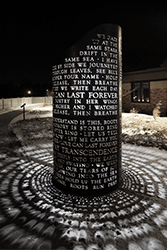Presentism
It was the best of times, it was the worst of times, it was the age of wisdom, it was the age of foolishness, it was the epoch of belief, it was the epoch of incredulity, it was the season of Light, it was the season of Darkness, it was the spring of hope, it was the winter of despair, we had everything before us, we had nothing before us, we were all going direct to Heaven, we were all going direct the other way—in short, the period was so far like the present period that some of its noisiest authorities insisted on its being received, for good or for evil, in the superlative degree of comparison only.
Charles Dickens, A Tale of Two Cities, 1859

The paradoxical opening lines of Charles Dickens’ novel A Tale of Two Cities, first published in 1859 as a weekly serial, have been quoted and parodied in many different contexts. (See fig. 1, Dogman: A Tale of Two Kitties) “The best of times” which were simultaneously “the worst of times” refer to the years surrounding the French Revolution, from 1775 to about 1793. Without going into detail, it’s enough to say that the French Revolution was a time of incredible turmoil which saw the social and political order of France completely overthrown. Revolutionaries overturned the established authorities, arrested and executed thousands, were often themselves arrested and executed as shifting alliances and power dynamics created chaotic and unpredictable swings in events.
For the common people who had for so long lived under an oppressive and uncaring regime of elites, all of the chaos and social disorder surely felt like it could be the beginning of “a season of Light.” They may have been willing to endure some chaos in exchange for a life that was a little more bearable than the one they had known up to that point. For those in the established order, of course, the aristocracy and the ruling class, it must have been terrifying and would have been received as a cataclysmic misfortune. It’s easy to see why Dickens could say that the same time period could be described by some as “the spring of hope,” while for others it was “the winter of despair.”
A wink from Charles Dickens
This single introductory sentence (a long one, by today’s standards) is generally taken to mean that the years the author was describing were unprecedented, the likes of which had never been seen in history, and would not be seen again. On a closer reading, however, I think we see Dickens wink in the last phrase. After describing the unprecedented and superlative nature of that time they were living, he goes on to say “in fact, it was just like today” implying that the noisiest authorities of his own day had applied all of these same terms or similar ones to the news in matters of the day.
An inoculation against Presentism
At first glance, there is some dissonance in reading Aristotle to better understand Artificial Intelligence, or in reading Thomas Carlyle for insight into Adobe tools, or Benjamin Walter to think about social media. Reading these older sources, though, I find voices that are a little removed from the fog of our current situation. They don’t have preconceived notions about the issues of our day, because they’d never heard of them.
In the trenches of the day-to-day, it’s easy to think that our own time is the most remarkable time that has ever been—a time of chaos and upheaval, where world events and the political situation were shifting day today—but Dickens, writing almost a hundred years after the French Revolution, acknowledged that people in the 1850s felt just as breathless about their own time as the subjects of his book felt in the 1770s. Our presentism makes us biased to see our own situation as the most [choose your superlative] time that has ever been. Another term might be “temporal exceptionalism.” Just like reading fiction about people unlike yourself makes you more empathetic, reading old books helps inoculate us against that time-bound myopia.
Skin and bones
There are large stores of wisdom in the past. It’s easy to think that our own time is unique—that the challenges we face are unprecedented and cataclysmic. The truth is that although the details—the places, the names of the principal players, the technologies involved—are all new, people a lot like us have faced situations a lot like these many, many times before. In the same way that every 20 year-old feels like their parents the generation before them can’t possibly understand the new and complex realities, it can be tempting to think that the writers and thinkers of 100 or 500 or 2000 years ago won’t have any insight to offer about our present situation.
Artificial intelligence and climate change, fraught political situations and this generation’s “wars and rumors of wars,” can all seem like uncharted waters, but there are similar precedents and there is wisdom to be found in how people in the past faced similar situations.
There are recurring cycles, ups and downs, but the course of events is essentially the same, with small variations. It has been said that history repeats itself. This is perhaps not quite correct; it merely rhymes.
Theodor Reik, “The Unreachables”, 1965
Although the skin—the surface details—of today’s crises are different, the bones are the same.
To read more articles like this visit: Uncategorized








